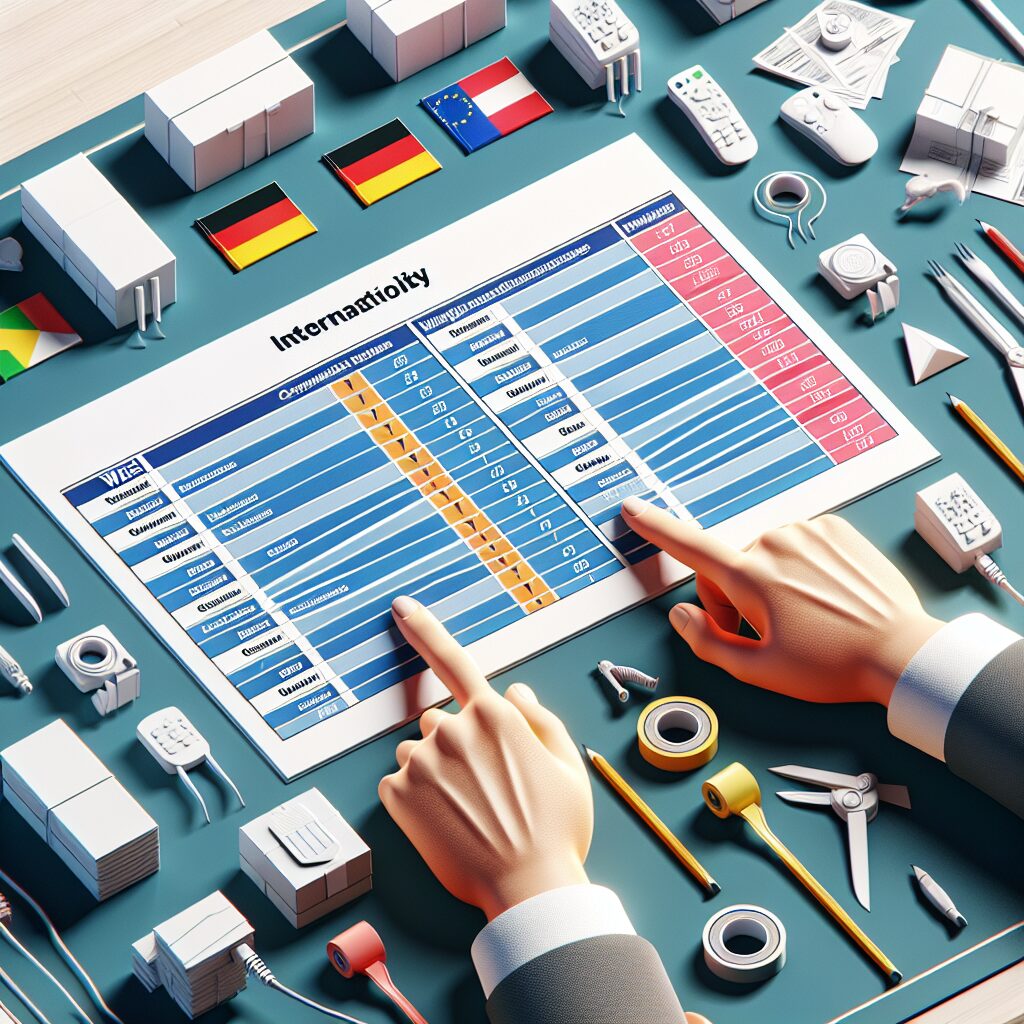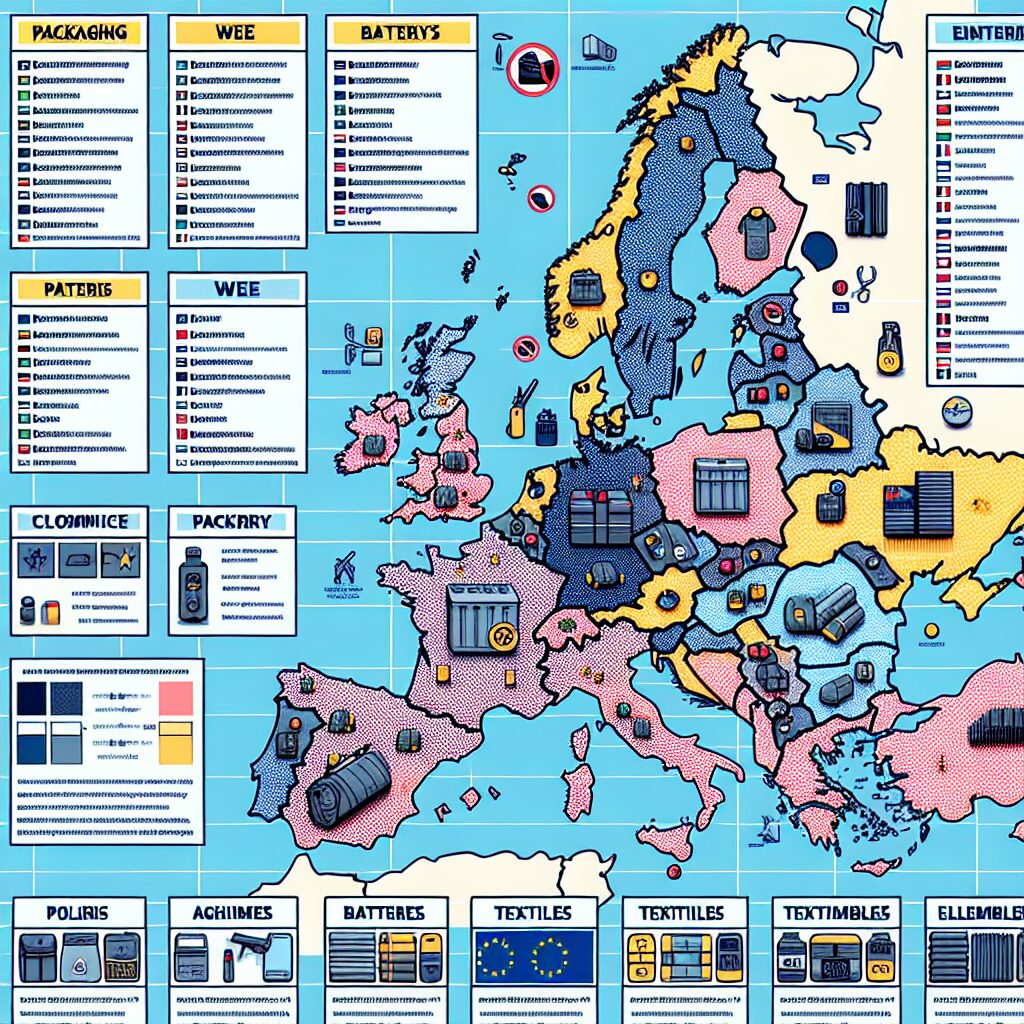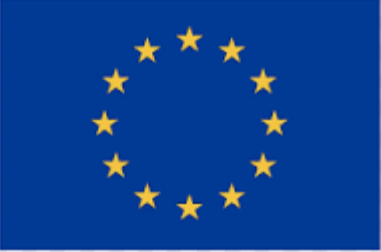About eldris
epr.eldris.ai leads the EPR sector, in fast, automated, AI Agent EU Complaince. LUCID Packaging, WEEE, and Battery Compliance for Brands, E-Commerce and Service based businesses expanding into the EU.
In This Article
- Prepare for changing EPR deadlines across all EU Member States in 2025
- Missing EPR Registration Deadlines can lead to fines and marketplace bans
- Deadlines and reporting formats vary per product type and country
- Use automation tools and consultants to simplify multi-country compliance
- Start compliance actions before Q1 2025 to avoid last-minute issues
Overview of EPR Changes Across the EU in 2025
New Rules and Obligations for Producers
As 2025 approaches, producers, importers, and marketplace sellers operating within the European Union are confronted with significant regulatory shifts. The most critical of these involves adherence to revised EPR Registration Deadlines. Under Extended Producer Responsibility (EPR) schemes, producers bear financial and operational responsibility for the environmental impact of products throughout their lifecycle — particularly concerning packaging, waste electrical and electronic equipment (WEEE), and batteries.
The EU is now enforcing more granular, country-specific registration timing and reporting obligations. Rather than a centralised system, each Member State is applying its own staggered deadlines and unique documentation requirements. This move aims to promote greater localisation in sustainable waste management but introduces a web of complexity for cross-border sellers. Learn more about EU Extended Producer Responsibility (EPR) & Packaging Compliance

Why EPR Deadlines Matter More Than Ever
The Financial and Legal Implications
Missing the EPR Registration Deadlines in any EU country can carry severe consequences. National compliance authorities, as well as marketplace platforms like Amazon, are enforcing these deadlines rigorously. Non-compliant sellers risk removal from online marketplaces, immediate product delisting, or even fines stretching into six-figure amounts.
Furthermore, failure to register appropriately may result in backdated producer obligations, which can accumulate across reporting periods. This not only impacts profitability but can irreparably damage brand credibility and trust — particularly when public registries expose non-compliant entities. For smaller SMEs, a single missed deadline can jeopardise market access entirely.
“Navigating the shifting terrain of EU EPR compliance without an accurate deadline calendar is like sailing without a compass — you may stay afloat, but you’ll never reach the harbour.”
Complete 2025 EPR Deadline Calendar by Country
Given the decentralised nature of EU EPR programmes, registration cut-offs vary significantly. In some countries such as Germany and France, early Q1 2025 marks the final chance to apply without penalties. Conversely, nations like Poland or Bulgaria set their deadlines much later, particularly for specific categories like packaging or WEEE.
For instance:
- Germany (Lucid Register): Packaging registration due by 15 January 2025
- France (Citeo, ESR): Annual declaration must be submitted by 28 February 2025
- Spain: Batteries require registration by 9 March 2025
- Italy: WEEE producer reporting due by 14 April 2025
- Netherlands: New market entrants must register packaging by end-March 2025
Maintaining a structured, consolidated view of all EPR Registration Deadlines is critical to implementing an effective regional compliance strategy. Read a related article
Key Differences in Country-Specific Regulations
EPR is not a one-size-fits-all programme. Producers must tailor their strategy to each Member State. In Germany, for example, the LUCID Packaging Register mandates real-time online verification and unique producer identifications. Meanwhile, France requires ongoing eco-modulation data submissions, factoring in recyclability and design attributes of packaging materials.
In Nordic countries, producers will need to engage with WEEE compliance schemes that demand quarterly returns, including consolidated product weights. On the other hand, some Eastern European nations have only recently launched fully digitised platforms, posing challenges for non-native speakers and newcomers unfamiliar with local institutional procedures.
Language barriers, lack of harmonisation in applicable product scope, and varying definitions of ‘producer’ continue to cause confusion and compliance ambiguity. Predictably, companies not adapting to each geography face the highest exposure to audit failures and administrative fines.
Deadlines for Packaging, WEEE & Battery Compliance
The three primary categories subject to EPR Registration Deadlines are:
- Packaging: Encompasses all wrapping, shipping, and point-of-sale materials. Deadlines differ by tonnage delays, volume bands, or company turnover.
- WEEE (Waste Electrical & Electronic Equipment): Covers electronic appliances, IT, household electricals, and their components. Bulk importers and cross-border online retailers must submit both historical and projected sales volume data.
- Batteries: Regulations split responsibility between disposable and rechargeable battery types. Reporting obligations often include detailed chemical composition breakdowns and evidence of disposal partnerships.
Each stream has country-specific stewardship organisations and reporting formats, further complicating holistic EPR planning. Understanding where and when each report is due — and to which entity — is essential.
Which Countries Pose the Highest Risk of Suspension?
Certain Member States are far more aggressive in enforcing producer compliance through suspension penalties or public blacklisting. At the top of this list is Germany, where failure to comply with LUCID registration constitutes grounds for immediate legal injunctions. Germany’s Federal Environmental Agency has initiated hundreds of audit investigations throughout 2024 alone.
France has also threatened removal of third-party sellers from government procurement eligibility if EPR documentation is incomplete or falsified. Spain and Austria have introduced new digital reporting dashboards that are cross-linked with customs and VAT systems to detect unregistered importer activity — meaning that omission is now easier to trace than ever before.
Non-compliance in these jurisdictions not only results in penalties, but also damages long-term access to logistical and warehousing partnerships.
Action Plan for Sellers Using Amazon and Other Marketplaces
Online retailers and marketplace merchants must adopt a structured compliance plan to avoid account penalties. Platforms like Amazon, Etsy, Zalando, and eBay have all declared that sellers are responsible for registering with correct local Producer Responsibility Organisations (PROs), and for submitting valid EPR registration numbers before listing affected products.
Start by identifying which of your SKUs fall under EPR scope across packaging, WEEE, and batteries. Then, map out per-country deadlines based on the destination market. Application submission forms typically require company registration details, legal representative credentials, and proof of prior product volumes — all of which can take weeks to compile.
Once you’ve confirmed registrations, input the resulting EPR numbers into your seller accounts. Failure to do so may provoke automated listing deactivation, especially in high-regulation regions like Germany or France.
Automation and Tools to Simplify Registration
With such a fragmented regulatory landscape, automation becomes a critical lever for avoiding missed EPR Registration Deadlines. Several SaaS platforms now provide multi-market EPR compliance management tools. These systems can centralise registration data, monitor submission status by country, and send alerts based on upcoming reporting cycles.
Some ecommerce platforms are even partnering directly with EPR service providers to embed compliance checks natively into seller dashboards. These integrations help validate registration numbers, ensure renewal dates are visible, and synchronise external documentation workflows with internal ERP systems.
Don’t overlook the value of expert compliance consultants. Although these services carry initial cost outlay, they dramatically reduce audit exposure and streamline international EPR onboarding.
Next Steps to Stay Compliant by Q1 2025
Given the implications, waiting until the new year to begin your EPR journey is too late. Instead, businesses should now:
- Audit Internal SKUs: Determine which products fall under scope.
- Build Country-Specific Compliance Tables: Include deadlines, obligations, and PRO contacts.
- Initiate Early Applications: Some Member States experience backlogs during Jan-March.
- Integrate EPR into Fulfilment Workflows: Ensure that packaging data is tracked correctly.
- Monitor Regulatory Updates: Laws may change before official cut-off dates.
Creating a dedicated EPR team, or ensuring one responsible officer within your organisation owns this function, is critical for long-term scalability.
Useful Links and Official Resources for EPR
Staying informed is easier when you know where to look. Below are key resources that can help guide accurate submissions and answer FAQs:
- <a href="Germany VerpackG 2025 compliance automation tool” target=”_blank”>EU Commission – Extended Producer Responsibility Overview
- Germany – LUCID Producer Register
- France – WEEE Scheme (ecosystem)
- Spain – Packaging Compliance
- Italy – Battery and WEEE Registration Portal
Bookmark these today and ensure your compliance function is cross-checking official requirements regularly.
Final Checklist Before Submitting EPR Documents
Before final submission, ensure the following components are ready and reviewed:
- Validated EPR registration numbers per country and waste stream
- Accurate weight and unit data for each product category
- PRO membership agreements and confirmation receipts
- Payable invoices (proof of contribution to national schemes)
- Internal sign-off from legal or sustainability departments
Each of these steps serves as audit protection in the case of spot checks or unexpected enforcement actions.
Conclusion and Final Tips for 2025 Registrations
2025’s diverse landscape of EPR Registration Deadlines presents both risk and opportunity for proactive businesses. Those who fail to prepare will face steep regulatory consequences. However, those who take the time to understand each country’s requirements and establish structured cross-border compliance mechanisms can gain a competitive advantage and build credibility with consumers and stakeholders alike.
Begin engaging with national producer responsibility bodies now. Maintain a shared compliance calendar visible to sales, finance, and operations teams. And always remember: EPR is not simply a regulatory checkbox. It is a cornerstone of sustainable business in the EU’s future.
Great guide on eu-epr-registration-deadlines-2025-country-calendar-missing-staggered-epr-deadlines-across-eu-countries-risks-marketplace-suspension-and-fines-this-consolidated-calendar-highlights-registration-a – Community Feedback
What are the changes in EPR 2025?
In 2025, new EPR regulations hold producers responsible for the entire lifecycle of packaging, including mandatory data reporting and precise documentation of packaging placed on the market.
Is EPR mandatory in Europe?
Yes, EU EPR directives are mandatory for all member states. Each country must integrate these requirements into national law by 2025.
What is the extended producer responsibility EU 2025?
The extended producer responsibility (EPR) in 2025 shifts packaging waste management costs from taxpayers to companies introducing packaging to the EU market. This covers both financial and operational duties.
How much does EPR cost in Germany?
EPR fees in Germany typically average around €200 per product category but can range from €40 to €2,000 depending on the product type and volume.










